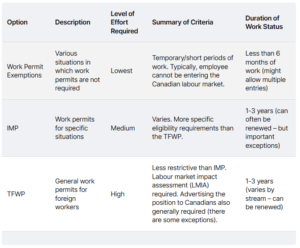If your business requires foreign employees to work in Canada, it’s crucial to understand the legal options for their employment. This article explores three primary pathways: work permit exemptions, the International Mobility Program (IMP), and the Temporary Foreign Worker Program (TFWP).
- Work Permit Exemptions: In some cases, foreign employees may not need a work permit if they are not entering the Canadian labor market directly. For instance, after-sales service agreements allow foreign workers to provide maintenance for products sold to Canadian clients, and certain film and TV productions may also qualify. However, these employees must be compensated from outside Canada and may need a Temporary Resident Visa (TRV) or Electronic Travel Authorization (eTA) to enter.
- International Mobility Program (IMP): The IMP provides work permits for positions that bring social, cultural, or economic benefits to Canada. Examples include intra-company transferees from countries with free trade agreements and professionals under the Canada-United States-Mexico Agreement (CUSMA). Each category has specific eligibility requirements, often based on occupation, professional qualifications, and contractual details.
- Temporary Foreign Worker Program (TFWP): When work permit exemptions and IMP options don’t apply, employers can use the TFWP to hire foreign employees if qualified Canadian workers are unavailable. However, TFWP applications require more documentation and typically involve a Labour Market Impact Assessment (LMIA) to prove the need for foreign workers .

Employers are advised to consult immigration experts to ensure compliance with Canadian laws and regulations.



No Comments - be the first.